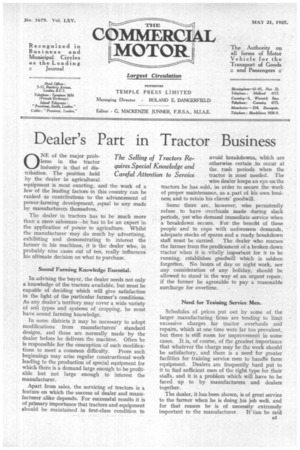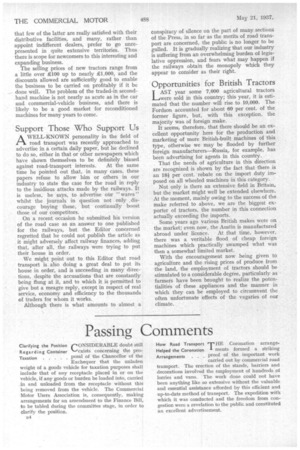Dealer's Part in Tractor Business
Page 37

Page 38

If you've noticed an error in this article please click here to report it so we can fix it.
ONE of the major problems in the tractor industry is that of distribution. The position held by the dealer in agricultural equipment is most exacting, and the work of a few of the leading factors in this country can be ranked as contributions to the advancement of power-farming development, equal to any made by manufacturers themselves.
The dealer in tractors has to be much more than a mere salesman—he has to be an expert in the application of power to agriculture. Whilst the manufacturer may do much by advertising, exhibiting and demonstrating to interest the farmer in his machines, it is the dealer who, in probably nine cases out of ten, really influences his ultimate decision on what to purchase.
Sound Fanning Knowledge Essential.
In advising the buyer, the dealer needs not only a knowledge of the tractors available, but must be capable of deciding which will give satisfaction in the light of the particular farmer's conditions. As any dealer's territory may cover a wide variety of soil types and systems of cropping, he must have sound farming knowledge.
In son-ic districts it may be necessary to adopt modifications from manufacturers' standard designs, and these are normally made by the dealer before he delivers the machine. Often he is responsible for the conception of such modifications to meet a common difficulty. From such beginnings may arise regular constructional work leading to the production of special equipment for which there is a demand large enough to be profitable but not large enough to interest the manufacturer.
Apart from sales, the servicing of tractors is a feature on which the success of dealer and manufacturer alike depends. For successful results it is of primary importance that tractors and equipment should be maintained in first-class condition to avoid breakdowns, which are otherwise certain to occur at the rush periods when the tractor is most needed. The wise dealer keeps an eye on the tractors he has sold, in order to secure the work of proper maintenance, as a part of his own business and to retain his clients' goodwill.
Some there are, however, who persistently refuse to have overhauls made during slack periods, yet who demand immediate service when a breakdown occurs. For the benefit of these people and to cope with unforeseen demands, adequate stocks of spares and a ready breakdown staff must be carried. The dealer who rescues the farmer from the predicament of a, broken down tractor when it is vitally important for it to be running, establishes goodwill which is seldom forgotten. No hours of day or night work, nor any consideration of any holiday, should be allowed to stand in the way of an urgent repair, if the farmer be agreeable to pay a reasonable surcharge for overtime.
Need for Training Service Men.
Schedules of prices put out by some of the larger manufacturing firms are tending to limit excessive charges for tractor overhauls and repairs, which at one time were far too prevalent, but there is still room for improvement in some cases. It is, of course, of the greatest importance that whatever the charge may be the work should be satisfactory, and there is a need for greater facilities for training service men to handle farm equipment. Dealers are frequently hard put to it to find sufficient men of the right type for their staffs, and it is a problem which will have to he faced up to by manufacturers and dealers together.
The dealer, it has been shown, is of great service to the farmer when he is doing his job well, and for that reason he is of necessity extremely important to the manufacturer. Iran be said that few of the latter are really satisfied with their distributive facilities, and many, rather than appoint indifferent dealers, prefer to go unrepresented in quite extensive territories. Thus there is scope for newcomers to this interesting and expanding business.
The selling prices of new tractors range from a little over £100 up to nearly £1,000, and the discounts allowed are sufficiently good to enable the business to be carried on profitably if it be _ done well. The problem of the traded-in secondhand machine is not nearly as acute as in the car and commercial-vehicle business, and there is likely to be a good market for reconditioned machines for many years to come.
Support Those Who Support Us
AWELL-KNOWN personality in the field of road transport was recently approached to advertise in a certain daily paper, but he declined to do so, either in that or other newspapers which have shown themselves to be definitely biased against road-transport interests. At the same time he pointed out that, in many cases, these papers refuse to allow him or others in our industry to state the case for the road in reply to the insidious attacks made by the railways. It is useless, he says, to advertise ofir " wares " whilst the journals in question not only discourage buying these, but continually boost those of our competitors.
On a recent occasion he submitted his version of the road case as an answer to one published for the railways, but the Editor concerned regretted that he could not publish the article as it might adversely affect railway finances, adding that, after all, the railways were trying to put their house in order.
We might point out to this Editor that road transport is also doing a great deal to put its house in order, and is succeeding in many directions, despite the accusations that are constantly being flung at it, and to which it is permitted to give but a meagre reply, except in respect of real service, economy and efficiency to the thousands of traders for whom it works.
Although there is what amounts to almost a conspiracy of silence on the part of many sections of the Press, in so far as the merits of road transport are concerned, the public is no longer to be gulled. It is gradually realizing that our industry is suffering from an overwhelming burden of legislative oppression, and fears what may happen if the railways obtain the monopoly which they appear to consider as their right.
Opportunities for British Tractors
LAST year some 7,000 agricultural tractors were sold in this country; this year, it is estimated that the number will rise to 10,000. The Fordson accounted for about 60 per cent. of the former figure, but, with this exception, the majority was of foreign make. It seems, therefore, that there should be an excellent opportunity here for the production and marketing of more British-built machines of this type, otherwise we may be flooded by further foreign manufacturers—Russia, for example, has been advertising for agents in this country.
That the needs of agriculture in this direction are recognized is shown by the fact that there is an 181 per cent. rebate on the import duty imposed on all wheeled machines in this category. Not only is there an extensive field in Britain, but the market might well be extended elsewhere. At the moment, mainly owing to the success of the make referred to above, we are the biggest exporter of tractors, the number in this connection actually exceeding the imports.
Some years ago various British makes were on the market; even now, the Austin is manufactured abroad under licence. At that time, however, there was a veritable flood of cheap foreign machines which practically swamped what was then a somewhat limited market.
With the encouragement now being given to agriculture and the rising prices of produce from the land, the employment of tractors should be stimulated to a considerable degree, particularly as farmers have been brought to realize the potentialities of these appliances and the manner in which they can be employed to circumvent the often unfortunate effects of the vagaries of our climate.




































































































